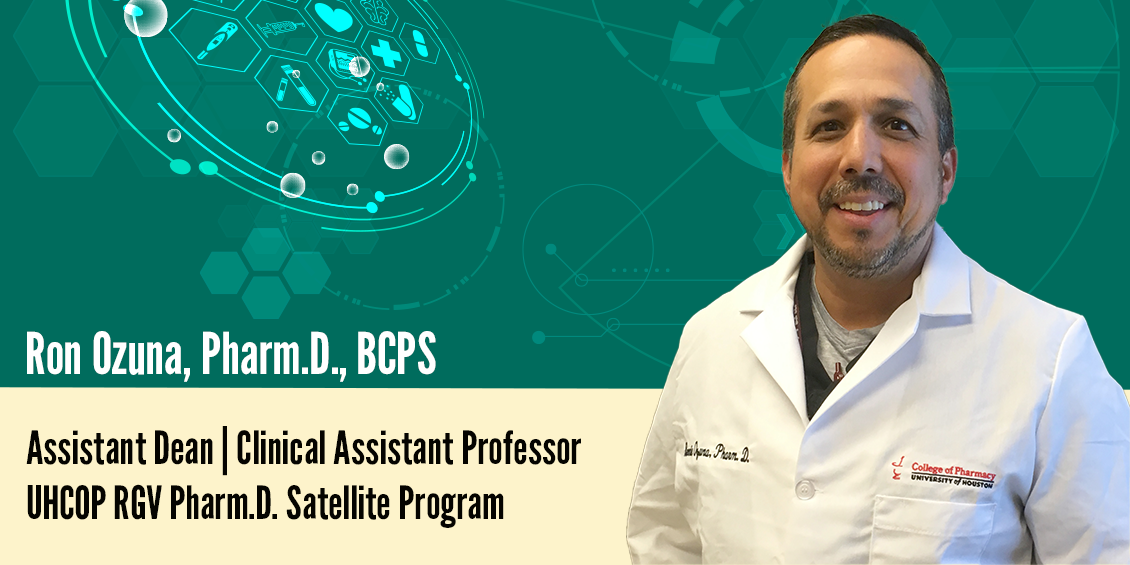Countering Health Disparities
Rio Grande Valley Pharm.D. Satellite Program Leader Bridges Health Gaps with Education, Awareness
The University of Houston College of Pharmacy's Ron Ozuna, Pharm.D., BCPS, was born in the vibrant and culturally rich city of McAllen, Texas, on the southern tip of the Rio Grande Valley (RGV).
Growing up with a love for science, Ozuna set himself on the path to a career in health care at an early age.
After graduating with a bachelor’s in biology, he became intrigued by the clinical role of pharmacists and how he could partner with medical teams and physicians to help patients.
Ozuna is now at the forefront of combating health care disparities at the heart of the RGV. He is giving back to his community with his expertise in infectious diseases, pharmacy management and student development.
For the past 24 years, Ozuna has been an integral part of DHR Health (formerly Doctors Hospital at Renaissance) in Edinburg, Texas, where he manages a team of clinical pharmacists and the health system’s Antimicrobial Stewardship Program development, maintenance, and compliance.
In addition to his clinical practice role, he also mentors aspiring pharmacists and facilitates their experiential learning as assistant dean and a clinical assistant professor for the UHCOP RGV Pharm.D. Satellite Program.
The 'Valley'
The Lower Rio Grande Valley is home to majority Latino border communities across Cameron, Willacy, Hidalgo and Starr counties. This unique population of more than 1 million residents is facing one of the hardest health care crises in the country.
According to Medicare data, the region is burdened with chronic diseases such as diabetes, obesity, Alzheimer's and hypertension. In Starr County alone, nearly 1 in 4 older people had Alzheimer's or a related dementia in 2021, compared to 1 in 14 nationwide. Roughly one quarter of the population is estimated to have hypertension, with one-half of those going untreated.
The federal government classifies all four of the RGV counties as "medically underserved" due to the lack of medical professionals.
The RGV Satellite Program
In an effort to enhance the clinical services and research opportunities within the RGV, UHCOP and DHR Health established an expansive collaboration partnership. One of the primary components of this collaboration was the creation of the RGV Pharm.D. Satellite Program, which offers varied fourth-year advanced pharmacy practice experiential rotation opportunities for UHCOP students to learn and train in pharmacy-led health care to the region's largely underserved population. An additional element of the program is to encourage participants to return to the area to practice after graduation.
"It is rewarding for me as a pharmacist to be able to give back, teach and mentor students through their experiential time with us," Ozuna said.
DHR
Founded in 1997, DHR Health is a 500-plus-bed, full-service health system with over 5,000 employees serving over 280,000 patients annually. DHR Health offers a full continuum of care in over 70 different specialties and subspecialties as well as a 24/7 functioning Level One trauma center.
"We go from trauma all the way to critical care service line, so the exposure that students get from a clinical perspective is considerable," Ozuna said.
Students have access to 20 different areas of practice for each six-week experiential rotation. They can request rotations in everything from neonatal to geriatrics, cardiology, infectious diseases, trauma and more.
DHR also has medical and pharmacy residency programs.
"By putting these two together, the medical and pharmacy students learn from one another, which allows for interprofessional training and that tiered layer of education is huge for them," Ozuna said.
Hispanic Healthcare Certificate
To enhance the preparation of students to serve the community, which is 91% Hispanic and 20% Spanish speaking only population, the college offers an optional first-of-its-kind Pharmacy Certificate in Hispanic Healthcare.
The program presents instruction not only in essential health-focused Spanish language but also Hispanic culture to foster a more integral approach to understanding and addressing the population’s health challenges.
"To those that are unfamiliar with the RGV area, it's a huge learning curve, and having that certificate in place provides them the opportunity to engage with our population," Ozuna said.
Serving such a large population of Spanish-speaking patients, DHR Health provides a range of services aimed at ensuring health literacy and comprehension to its patients. These services include certified translators across multiple service areas, including clinical staff members such as Ozuna, and communication technologies for those with visual or hearing impairments.
Representation in Research
According to Ozuna, priority number one for the future is to represent the underrepresented population of the RGV in research.
To achieve this goal, UHCOP faculty and DHR Health Institute for Research and Development investigators are collaborating on various research projects. Some of their projects include studies on Clostridiodes difficile infection, medication adherence, opioid misuse, and bariatric surgery impacts with certain medication regimens among ethnic groups.
"That’s been our goal since the inception of the program, in terms of strategic plans, is to ensure that our underrepresented population is represented in our research," Ozuna said.
Impact of the RGV program
The unique circumstances of patients in the RGV require a holistic approach. According to Ozuna, the most important aspects of the satellite program are raising awareness of the health challenges and barriers facing the community and the role pharmacists can play in helping patients overcome them.
"All the social determinants of health are involved in through this type of clinical approach that we have," Ozuna said. "That awareness is much more than just writing prescriptions for those patients; it is ensuring that they can get medication with all the social determinants on their health."
